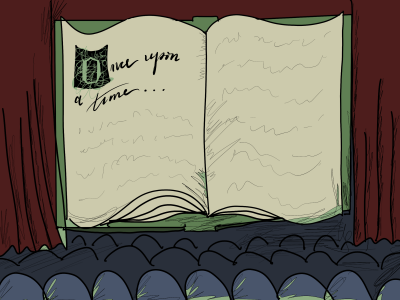In recent years, it seems that an increasing number of the films and television series being released are adaptations of popular books. From the iconic Harry Potter franchise to the more recent adaptation of the novel “Lessons in Chemistry” by Bonnie Garmus, Hollywood is in a perpetual search to turn the newest literary masterpiece into a cinematic experience.

While it may look like an easy cash grab for studios in Hollywood that requires little to no creative effort, these adaptations may actually benefit both the legacy of the books it adapts and the consumers captivated by these fantastical stories.
There is a popular sentiment amongst fans of literature and cinema: “Read the book before you watch the movie.” This phrase holds true for many readers and only encourages readers to pick up a book before watching the movie.
In an age where readership numbers are down around the country, with one report showing the average American read two to three fewer books in 2021 than they did between 2001-2016, the expensive advertising campaigns of blockbuster movies can contribute to promoting the source material of whichever film is being adapted.
The show “Game of Thrones,” which seems more like a cultural phenomenon than a mere television series, is a prime example of how the product on the screen can help promote the words on the page.
A 2019 article published by USA Today found that following the series finale of the television series, the books hit No. 8 on the bestseller list — its highest ranking since 2013.
However, a huge criticism of “Game of Thrones” was that once the showrunners ran out of source material to adapt, the creativity and authenticity of the show plummeted.
Yes, this can signify a lack of creativity in Hollywood, but it also demonstrates the fact that adaptations must be executed perfectly. Not every adaptation can remain 100% faithful to the original material and creative freedoms on the part of the director and writers must be taken.
Director Christopher Nolan adapted Kai Bird and Martin J. Sherwin’s nonfiction book “American Prometheus” into the 2023 blockbuster film “Oppenheimer.” While the film is classified as an adaptation, it is a beautiful example of a director implementing their own creative touch onto a film.
The book, while successful prior to the movie, skyrocketed in popularity after the release of the film. As of today, the book sits in the No. 3 spot on Amazon’s bestseller list for nonfiction books. Not only is it No. 3 on the list, but it’s held a spot on the list for nine consecutive weeks — roughly the same amount of time the movie has been in theaters.
Another aspect of on-screen adaptations that appeal to audiences is the familiarity of the story. This makes embarking on a two-hour experience or a multi-year emotional commitment much more digestible and comfortable for viewers — it’s the same feeling as rewatching a favorite show to provide comfort.
While adaptations can sometimes destroy the imagination given to readers who are forced to visualize a story with nothing more than what the author writes, the adapted versions of books can often bring a story to life with spectacular visual storytelling.
When examining “Oppenheimer,” Nolan was able to use visual techniques to add a dramatic flair to a story which at times may lack intrigue. In fact, it’s been reported that Nolan used a variety of props and special effects to mimic the explosion of a nuclear reaction rather than use CGI — a visual experience books would never be able to simulate with words.
It’s important not to understate the importance books have on pop culture, but it’s negligent to disregard the role movies and TV shows play in promoting the content that typically stems from books.
In a time when readership is low and viewership is high, adaptations are a happy medium to promote quality storytelling without sacrificing the creativity that makes these coveted stories unique.
This editorial was written by Opinion Editor Brett Abrams




















































































































